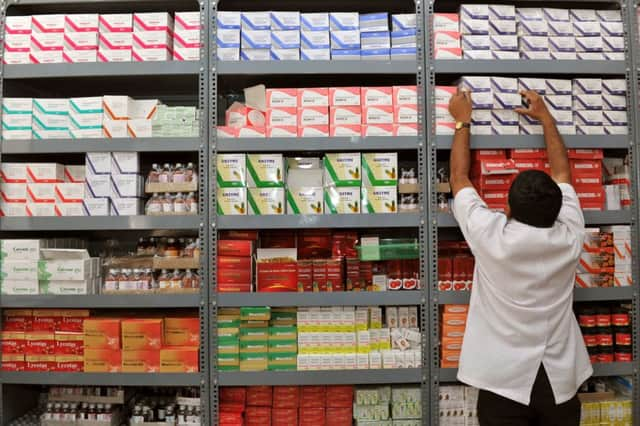Community pharmacies can play a major role


The drugs bill in Scotland topped £970.4 million last year while the number of medicinal items on prescriptions reached 98.4 million – and an increase of around 2 per cent is predicted for this year.
The reasons for this rise are simple: people in Scotland are living longer but often with conditions which require intervention. (There is no evidence free prescriptions have contributed to the increase, which was happening before prescription charges were abolished.)
Advertisement
Hide AdAdvertisement
Hide AdThe fact that the population is living longer is obviously to be celebrated but it does bring challenges for the health system in terms of resources.
So how can community pharmacy be part of the solution to this ever-increasing demand and cost to the NHS? The dispensing of the items on prescription forms part of the income for community pharmacies. Community pharmacy has often been labelled as having a vested interest in seeing the number of items rise: “This must be good for you” was often the cry. However, in Scotland the contract has evolved to ensure more than half the community pharmacy income is now derived from service provision. This contract, with an emphasis on service provision, is the envy of the rest of the UK which, as yet, has not made the step change in this direction. The Scottish pharmacy contract puts the clinical skills of the high street pharmacist to the fore as they work with patients in areas such as public health and long-term conditions management.
It is the latter area where pharmacists can make a difference in helping patients to get the best out of their medicines. Not only does this maximise the return from a large and increasing drugs bill, it also ensures that the investment in patients is not wasted. Drug waste in Scotland is a big issue and there is estimated to be around £30m pounds of savings potentially to be made with no impact on patient care. This is the essence of why pharmaceutical care provided by pharmacists in the community is so important.
When doctors and pharmacists talk about “polypharmacy” they mean multiple medicines prescribed for multiple conditions.
This is very high on the agenda of the Scottish Government and formed part of the narrative in the pharmacy strategy document Prescription for Excellence published last year.
We must avoid assuming it is in some way bad that a patient is prescribed multiple medicines; it will often be entirely appropriate. However, the pharmacist’s role here is to assess the benefits and risks (side-effects, interactions) of these multiple medicines and discuss these with patients and other healthcare professionals to determine what will deliver the best treatment.
Many pharmacists are now looking at polypharmacy through prescribing roles and clinics, but more can be done.
Community Pharmacy Scotland would call for the inclusion of a clear polypharmacy strand within the Scottish community pharmacy contract with appropriate remuneration; this will build on the work taking place in the long-term conditions element of the contract but also provide an emphasis on this specific policy area. As the experts on drugs, pharmacists have the skills to make a difference: now they need the framework to do so.
Advertisement
Hide AdAdvertisement
Hide AdOn the back of this we would also call on further tools to be provided to the network of 1,250 community pharmacies to enable them to maximise their effectiveness by providing access to appropriate medical records. With the correct checks and balances this is a must to allow pharmacists to use their expertise to maximum benefit for patients in conjunction with other healthcare professionals. Giving community pharmacy the framework and the tools will not only benefit the NHS financially, but will optimise care for patients throughout Scotland.
• Harry McQuillan is chief executive of Community Pharmacy Scotland www.communitypharmacyscotland.org.uk